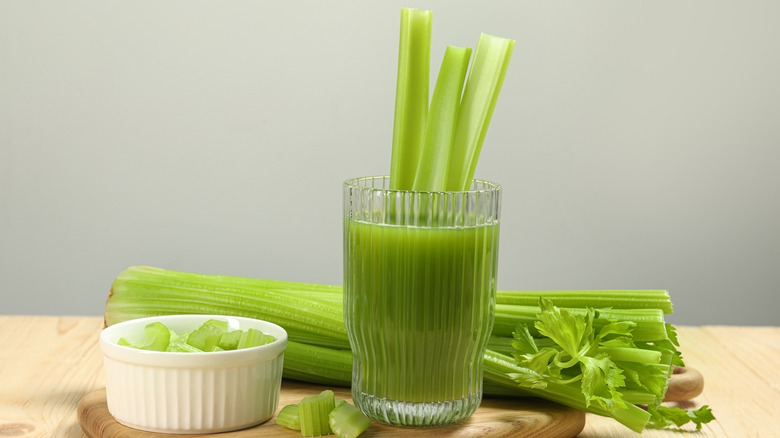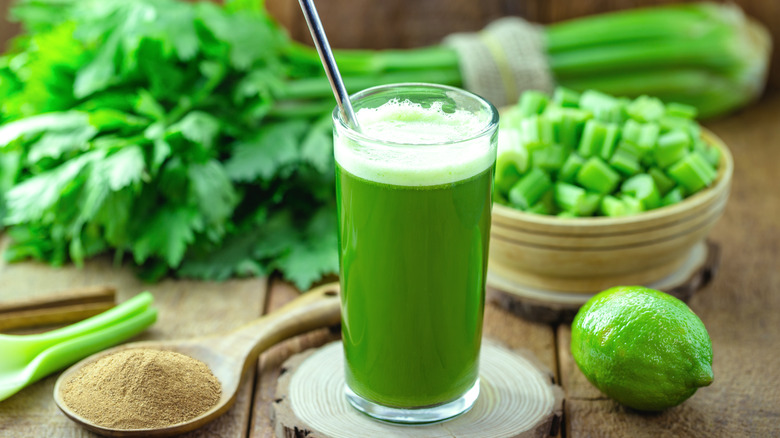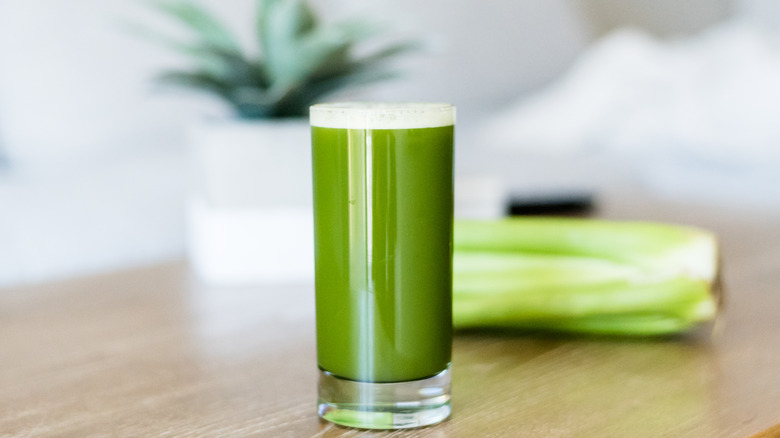Swap Lemon With Celery Juice For A Bright But Less Acidic Punch
While lemon juice might offer a bright punch of acidic flavor in a recipe, that juice might not be worth the squeeze in every scenario. In those cases, it might be time to leave the fruit in the basket and grab the celery stalk instead.
Acidic ingredients, like lemon juice, can be used to keep food from tasting flat. A palate-pleasing dish balances the ratios of salt, fat, and acid. The uses for lemon juice in a dish can vary from a simple squeeze to finish a fish filet or a cup to brighten a rich pound cake. While a subtle amount can lift the flavor, an overabundance can result in an unpleasant sour, lip-puckering taste. Unless the dish is intended to be lemon-forward, the lemon juice should be a background note, supporting all the other flavor elements to make them stand out.
Since lemon's flavor can sometimes be too aggressive, celery juice can be a great substitute in some scenarios. Featuring a more subtle acidic flavor, the vibrant vegetable juice can accentuate a hidden spice, cut through unctuous fat, or heighten a sweet element. For example, celery juice adds a zesty note to a smoothie without the sour aftertaste that lemon juice might cause. Celery is more than just the garnish in a Bloody Mary or the base of a mirepoix; it's also an underutilized hack for a more balanced recipe.
Is lemon to celery juice swap a one to one ratio?
While a squeeze of lemon juice on a dish right before serving can make a difference in the flavor, squeezing a celery stalk for juice requires more than Herculean strength. Transforming that verdant vegetable into a well-balanced recipe component may require some cautious planning.
Celery has a pH level between 5.7-6 and lemon juice has a pH level between 2-2.6. That lower acidic level is why some cooks swap celery for lemon. We won't get into complicated conversion equations, but the replacement of one ingredient for another can require some experimentation. The cooking rule of taste and taste again applies here: Add a bit of celery juice and then taste your recipe before adding more. It's easy to add flavor little by little, but it's harder to balance an off-kilter dish that's been ruined by too much celery.
Since celery juice requires the vegetable to be processed, cooks should be aware of the differences between prepared and freshly juiced celery. Some pre-made juices might contain added ingredients like lemon, ginger, or even apple juice. This might make the juice more palatable on its own, but the additional flavors may be inappropriate for some recipes. For this ingredient swap to work well, it would be better to use freshly juiced or homemade celery juice. Ensuring that celery, and only celery, is the only added ingredient is key for this swap to work well.
Are there scenarios in which celery juice may not be a smart swap?
While celery juice's vibrant color and flavor can bring balance and brightness to a dish, some situations may not benefit from that squeezed stalk. In light-colored sauces, the green color could create a muddy, unappealing appearance. Basically, any recipe where the vegetable's hue would overtake the other ingredients would not be a great choice for trying out this swap. Think of how some cooks use white pepper to avoid contrasting black specs in a white cream sauce — you don't want to ruin the look of a dish by turning it green. After all, Kermit knows that it is not always easy being green.
In some scenarios, swapping lemon juice for celery juice would also have a less-than-appetizing effect on taste. Lemon-forward dishes, like a luscious lemon curd tart, Sole Meuniere, or Spaghetti al Limone, require the use of the citrus fruit. In contrast, recipes that use lemon in a marinade could easily swap in the celery, as long as the whole flavor remained in balance. Overall, this ingredient swap seems more plausible in savory cooking. It seems unlikely that celery bars or celery poppy scones will be flying off the dessert table.
In the end, substituting celery juice for lemon juice can be a viable solution in some scenarios. When that citrus squeeze is just too aggressive, it might be time to head to the crisper and juice some of those celery stalks.


